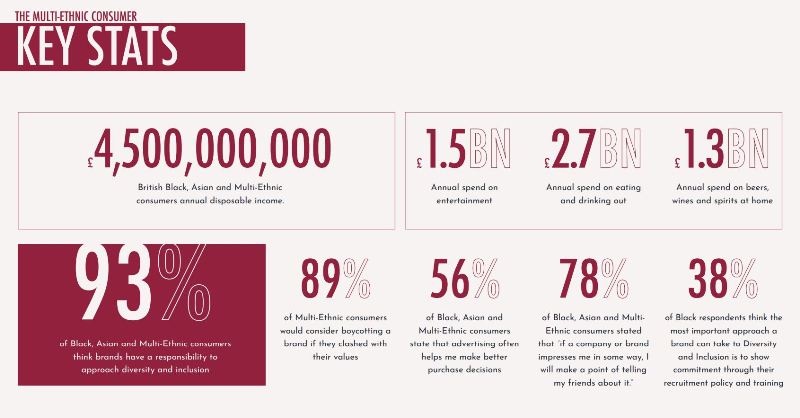By Debbie Ransome
For many in the Caribbean diaspora in Britain, Rudolph Walker is a national treasure. Not

A new report collates the figures on how black people spend and save
A report issued at the end of January 2022 puts a price tag on the spending power of Britain’s black community and its brand loyalty potential.
The Black Pound Report 2022, published on 31st January, indicates that black professionals today are keen savers and search for product satisfaction in a retail market which often misses out on the importance of diversity. The report also finds that they are more likely than their white peers to recommend a satisfactory product - once they find it.
“The Multi-Ethnic professional is driven, ambitious and keen to earn more than previous generations,” the report indicates. It adds: “They are dynamic self-starters and entrepreneurs.”
The top-line figures are not to be ignored. The Black Pound Report states that the black, Asian and so-called “multi-ethnic consumer” population has, on average, £374.3m of monthly disposable income. This demographic also has £851.2m in personal savings and investment.
This group also has an acute understanding of the power of their money and told the team collating the report that they’re more likely to consider boycotting brands if there is any evidence of discrimination or racial insensitivity.
“Multi-ethnic consumers are more driven by ethics and values,” the report states. It advises that “brands that particularly focus on ethics and values could benefit from this”.
The report casts a wide net. It sought to provide an insight into the spending habits of the 16% of the UK’s 70 million people who identified as Black, Asian and multi-ethnic consumers in the UK – that’s 11.2 million people. The survey compilers interviewed 3,500 people within this grouping.
The report’s authors stated that they used a diverse team of interviewers to be able to reach an audience “who may not have previously engaged with research of this kind”. The report stated that this gave researchers “new, fresh” insights into attitudes, behaviours and brand identities.
Word of mouth
The report estimates that the “word-of-mouth” retail potential of black consumers is higher than their white counterparts. Once they find a suitable product, they pass on the good news.
“Personal recommendations, preferred payment methods and trusted reviews are critical factors in making large purchases and investments,” the report states.
The study also finds that so-called “multi-ethnic consumers” are happy to become ambassadors for brands that they trust.
The report highlights the health and beauty retail market. Even the company founder Lydia Amoah relates her own experiences growing up and trying to find products to suit her skin colour and being told that the retail outlet only stocked “normal” colours. It’s a tale that every woman of colour born and brought up in the UK can relate to.
The report’s respondents indicated a preference for brands which cater to a range of skin colours. These consumers said that they wanted retailers to show diversity throughout their business chains – from their advertising to the in-store experience they offer.
Paying attention
This is not the first such report or campaign to focus on the power of the black pound. Caribbean Intelligence© has regularly documented the rise of the spending power of the black community and campaigns to encourage people to use their spending power to help their communities.
The Black Pound Report is the brainchild of Lydia Amoah. She is the founder of the BACKLIGHT consultancy agency, which specialises in advising UK business on moving towards more inclusive recruitment and more diverse HR strategies. The BACKLIGHT team offers insight and data to help businesses create what they call “innovative change”.
Why should the UK retail industry care? The report’s figures provide the answer. Multi-ethnic consumers spend 48% more than their white counterparts on make-up and 58% more on their hair products.
Despite some retailers moving into a wider range of products, 39% of female black shoppers interviewed said that it was not easy to find cosmetics and skin care for their skin type. At the same time, 22% of all multi-ethnic consumers and 30% of black women said that they bought their health and beauty products from specialist shops.
Why bother? The figures indicate a demographic in the UK which spends more than £2.7bn a year on health and beauty. Beyond the politics and the caring, it clearly makes economic sense.
Ms Amoah’s BACKLIGHT states that it helps companies “become more inclusive”. She says that this helps companies to increase profitability, drives inclusive recruitment and leads to brands with a broader reach.
“I would like the Black Pound Report to change how brands treat their consumers and treat everyone with respect and serve them equally,” she said.
“For the first time, this report shows the untapped economic power of the Multi-Ethnic consumer and allows businesses to understand an audience that has rarely been researched in depth. From media consumption through to health and beauty product choices, Multi-Ethnic consumers have distinct motivators. Businesses must understand and reflect these to sell their products and services and be truly inclusive.”
Caribbean Intelligence© is a news and current affairs website which publishes original articles about the economic, political and culture life in the Caribbean and the Diaspora. Our news page collates pan-Caribbean news items from around the world.
Coming soon: Pre-order the seminal book on the economics of slavery soon to be available in the UK:
By Debbie Ransome
For many in the Caribbean diaspora in Britain, Rudolph Walker is a national treasure. Not
Caribbean Intelligence review of Sweet Li Jie by David Dabydeen
Review by Debbie Ransome, Managing